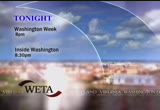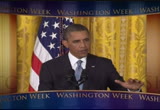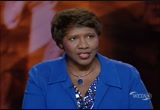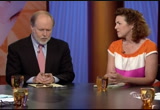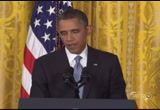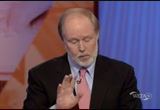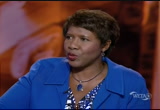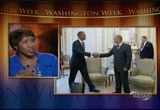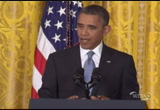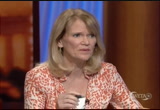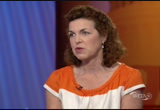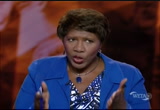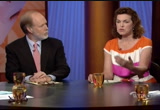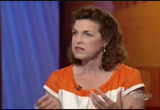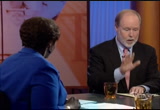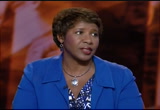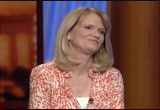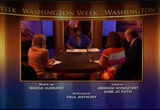tv Washington Week With Gwen Ifill PBS August 9, 2013 8:00pm-8:30pm EDT
8:00 pm
gwen: a rare presidential news conference covers the waterfront on foreign and domestic policy. we sort out the details tonight on "washington week." who's listening in? >> i want to make clear. once again. that america is not interested in spying on ordinary people. i don't think mr. snowden was a patriot. gwen: how dangerous is al qaeda? >> this is an ongoing process. we are not going to completely eliminate terrorism. gwen: how frosty are things with russia? >> i think there's always been some tension in the u.s.-russian relationship after the fall of the soviet union. gwen: and how frosty are things with congress? >> we're not in a normal atmosphere around here when it comes to "obamacare." gwen: these issues and more will follow the president as he
8:01 pm
leaves on vacation. we take a look with doyle mcmanus of the "los angeles times." martha raddatz of abc news. and alexis simendinger of realclearpolitics. >> award-winning reporting and analysis, covering history as it happens, live from our nation's capital, this is "washington week with gwen ifill." corporate funding for "washington week" is provided by -- >> we went out and asked people a simple question -- how old is the oldest person you've known? we gave people a sticker and had them show us. we learned a lot of us have known someone who lived well into their 90's. and that's a great thing. but even though we're living longer, one thing that hasn't changed, the official retirement age. the question is, how do you make sure you have the money you need to enjoy all of these years?
8:02 pm
>> additional funding for "washington week" is provided by the annenberg foundation, the corporation for public broadcasting and by contributions to your pbs station from viewers like you. thank you. once again, live from washington, moderator gwen ifill. gwen: good evening. the president of these united states strolled into the white house east room today to unburden himself of a few things. before he follows congress' lead and escapes washington for a summer vacation. but the next 10 days will clearly not be a vacation from work. in his briefcase, how to soothe fears about domestic surveillance programs. how to paper over a cold war-like rift with vladimir putin and how to brace for republican pushback on various domestic issues like health care. >> my friends in the other party have made the idea of
8:03 pm
preventing these people from getting health care their holy grail. their number one priority. the one unifying principle in the republican party at the moment is making sure that 30 million people don't have health care. gwen: but let's start with the president's comments on domestic surveillance programs where he promised greater transparency and said the u.s. is still better at it than its critics. >> it's true. we have significant capabilities. what's also true is we show a restraint that many governments around the world don't even think to do. but refuse to show. and that includes by the way some of america's most vocal critics. gwen: so if we are so good at this, what is the president proposing to fix? alexis? >> well, one of the things he quickly disclosed that he wanted to quicks was americans' discomfort with the idea of domestic surveillance and how it's being used here and
8:04 pm
abroad. he talked about that full out. he said the question is, how do i make the american people feel more comfortable? and in some ways, he was trying to deny that he would have done this without the disclosures from edward snowden or perhaps from the agitation on capitol hill and the efforts to try to deal with some of this legislatively to clip the wings of the national security agency. but what he was proposing to do was try to make things more transparent, he said. he wants to put together a taffing force which in the old obama world would have been where you put things into the filing cabinet, right? but he wants to put together a task force of experts he's been talking to, tech and c.e.o.'s. >> i legal week we've been here before. >> and worked with congress on pending legislation. and democrats and republicans have come together on legislative efforts. gwen: is your sense, doyle, that this is really -- this really is, no matter how much he says, this all in the works before, edward snowden was at least a catalyst for it? >> there's no question that edward snowden was a catalyst.
8:05 pm
there was a little bit of stuff that the administration was doing. yes, they were reviewing their procedures. yes, they tell us that they have tightened up some procedures. but here's what hadn't happened until snowden came along. congress wasn't paying any attention. you had ron wyden in the senate and a few others saying hey, folks, there's something here you should be worried about but there was no pressure to move on any of this. so there's no question that this package of changes, in addition to a task force the president did have one specific he talked to which was changing the procedures of the court that rules on these issues and putting an adversary in there, someone arguing the other side, that one -- that idea has been around for months or years. and it was getting nowhere fast until edward snowden. gwen: apparently wyden let it be known that a lot of these ideas were his originally. the president said he was almost disdainful when asked about snoweden and said he is no patriot but also said there were many other ways that
8:06 pm
someone's conscience was stirred that they could have acted. is there this idea after whistleblower avenue? >> he's saying come back. and if you really believe that, go on trial and we'll charge you with these three felonies and we can see if there's another way that you could have -- gwen: very appealing. >> very appealing i'm sure to edward snowden. the president made very clear he doesn't really -- he likes these programs. his assessment of these programs, i think, he said, has not really evolved. one of my favorite moments in the press conference about this was our john karl stood up and said mr. president, if you're being so transparent, can you talk to us about these drone strikes? because there have been so many drone strikes in yemen after the past week. and the president i thought looked a little taken aback by that and said nothing about those drone strikes and those drone strikes are tied into n.s.a. intercepts. gwen: secrecy still remains. this was a lot of talk but secrecy is still something that this administration's wedded to. >> one of the things that the
8:07 pm
president has struggled with is this idea that he believes the checks are there. the potential for abuse has been limited. but he struggles with this idea that he's not trusted. and that was -- that was a question posed to him today. do you understand why americans are not trusting that you're saying we have this capability but we won't abuse it? one of the interesting things is i think this president is looking far ahead now at the next president and thinking part of his legacy is to put things together so that he can, you know, all presidents think they're on the side of the angels. but to hand it over to his successor in some way. that the american people are comfortable with it and it will prevail after him. >> and also important to remember, as i think martha alluded to, the things the president did not say. he did not say that -- that the collection of data about your phone calls, those phone records, ought to be reined in or access to that ought to be
8:08 pm
controlled more than it is now. gwen: he just wants to reassure everybody. >> he did not say -- he did not say that the collection of emails that go overseas ought to be limited beyond. gwen: this was all about domestic surveillance. >> yeah. gwen: it was interesting because there were so many things covered in the news conference and we will get through as many as possible. because also, which world leader, if you are watching this today, which world -- which jeopardy quiz was compared to a schoolboy slouching in the back of the room? >> when president putin, who was prime minister when medvedev was president, came back into power, i think we saw more rhett relinquishing on the russian side that was anti-american, that played into the old stereotypes about the cold war contest between the united states and russia. and i've encouraged mr. putin to think forward as opposed to backward. on those issues. with mixed success. gwen: mixed success.
8:09 pm
and at the same time, russian foreign minister sergei lavarov was at the state department downplaying any rift between the two nations. secretary of state john kerry compared the tension to occasional collisions in a hockey game which sounds very kerryesque. is that what the problem is here? >> that would be a good thing if that were the only -- if that were the only problem. that's actually a figure of speech that john kerry has used before. because both he and sergei lavarov have played hockey in their youth. kerry still does and i don't think lavarov still does. they sparenlt get along ok and an important part of the u.s.-russian relationship is managing all of those places where the two countries collide with each other. they don't agree on missile defense in europe. they don't agree on syria. they don't agree on a whole lot of things. gwen: iran. >> iran they're a little closer. but basically they don't agree. but this -- this has gotten much worse. what we really saw this week, look, the reset of the relationship with russia was one of the proudest
8:10 pm
accomplishments of president obama's first term. him and secretary clinton. then the secretary of state. for a long time, the administration has at least publicly been in denial. these are just small bumps on the road. these are collisions on a hockey rink. but things are basically ok. what this week made official is that the reset has gone into reverse. and nobody can deny it. it would be nice if these were just -- friendly hockey players bumping into each other but when the president of the united states compares the president of russia to a schoolboy slouching in a chair in the back of the room, you can't deny there's something personal there. gwen: there was something throughout this press conference whether casual descriptions about willy-nilly this and school boys that. it seemed that in this particular case he couldn't be doing it by accident. the relationship between -- >> yeah. gwen: and medvedev and he, very different. >> very, very different. and you don't say those things about another world leader. you just don't say those things if you're trying to say it with great respect.
8:11 pm
there was no great respect there. anything he said. and it's not a reset button, it's a rewind button. it really is. he said it's time for a pause. you can -- and thinking this week, you can almost see president obama just saying, i've had it with that guy. i've just had it with that guy. let him slouch somewhere else. gwen: he made that slouching comment, that this is what you notice, body language. t when we meet, we're blunt, candid. and sometimes -- >> pause. and occasionally helpful or constructive. >> right:exactly. there is no question that that international putdown was meant to be a slap at someone in russia, fancy themselves a blend of james bond and marlin brando, right? this is -- his image at home is supposed to be a slap toward him. and it was stunning to hear it. gwen: and at the same time, we mentioned sergei lavrov and john kerry, and chuck hagel and
8:12 pm
his counterpart, perfectly cordial relationships. having a conversation. it was moving along. so some of this real work getting done? >> both. there's still a big long agenda that has to get done. all of those issues we named and others that include trade, that include -- edward snowden, that include all kinds of things. and yoyoyo can't let those go b the board. but it's clear that the obama-putin relationship isn't moving things forward. i thought one of the interesting unasked questions about canceling the summit in a sense was compared to what? would this summit -- in the old days, you had a summit with a russian leader when you knew there was going to be clear progress forward. gwen: which actually was part of the administration's explanation for counseling. >> we had gotten away from that and this relationship was so close and you would have a routine summit and didn't have to have forward progress. now we're back to the old cold war rules. if you think of the kind of summit this would have been, if
8:13 pm
the president had gone ahead number one, obama would have undergone terrible criticism for looking weak and spineless. he would have given putin an enormous boost on prestige. and obama would have had to go into that meeting and say, give me edward snowden. mr. putin would have said, get on your horse and get out of here. and barack obama would have looked humiliated again. >> a great "washington week" to talk about that. gwen: even better to be in the room. and we would like to do that. there was another big topic. renewed threats from al qaeda that brought about u.s. evacuations this week from yemen. which raised the question, has al qaeda as promised been des meated? -- decimated? this is the president's answer. >> this tightly organized and relatively centralized al qaeda that attacked us on 9-11 has been broken apart. and is very weak. and does not have a lot of operational capacity.
8:14 pm
and to say we still have these regional organizations like aqap that can pose a threat. that can drive potentially a truck bomb into an embassy wall and can kill some people. gwen: so was that the fear of what was happening this week and that's why americans were evacuated? >> yes. the officials i've spoken to say that was precisely the fear in yemen. it started in yemen. was the threat to blow up the u.s. embassy or the british embassy. and they thought truck bombs were out there. it expanded the threat. one of the things that happens is when there's a threat in a certain country you throw in all your assets and get more drones in there and get more surveillance so you hear more, you see more. and i think the threat expanded. and that's why they closed all the other embassies. gwen: which will be reopened. >> reopened on sunday. except the embassy in yemen. one of the things when i listened to president obama talk about decimating the don't uade, i think we
8:15 pm
know what we don't know. as much as we think we know, the fact that osama bin laden is dead, terrific, that broke up core al qaeda. but no one capable of 9-11, that's a dangerous road to go down and say that publicly. they are still very fearful someone is going to get a body bomb on an airplane or another printer cartridge that will actually work to bring down an airplane. and frankly, who knows what other plots are out there? i don't mean to sound doom and gloom but i don't think we know what we don't know. even though our intelligence is pretty terrific. gwen: and international surveillance. we're not going to give that up -- >> and we had al-zarqawi who is bin laden's number two guy and number one guy in core al qaeda if you want to call it that, communicating with the head of al qaeda on the arabian peninsula. that tells you something, too. gwen: was there any sense at the white house, alexis, that
8:16 pm
part of what drove this was in the way that edward snowden drove the announcements about surveillance today that the -- the fallout from benghazi may have driven some of his decision to shut down so many embassies, so many government without such a broad -- >> oh, clearly. and i don't think there was any apology for that. that we heard at the white house. anyone i talked to. it was about this is the era of abundance of caution. and you also heard members on the hill who had been critical of what had happened after benghazi saying publicly, we can't be critical of that. and then try to be critical of this idea of being on the side of -- ultimate safety or extra safety. the president was also as martha is saying, sort of caught in this idea that he had claimed a certain level of victory over al qaeda. now -- gwen: and leon panetta, former secretary of defense. >> absolutely. and campaigned on that. aggressively in 2012. so i could hear this sort of
8:17 pm
downgrading verbally the rhetoric, and he's tamping it down. but the actual activity level had certainly been quite dramatic. >> i just want to say quickly about benghazi, this is a huge change in the last 10 days. they are overriding ambassadors. they are saying i'm sorry, it's no longer your decision. we're the ones who are going to make the decision. and we're going to decide whether your embassies and consuls are closed. >> a lot of those working diplomats want to keep those embassies open and under the radar at the state department, a lot of talk about this really feels like an overreaction. are we going to be weak? actually, the government of yemen put out a statement saying you folks are going out of business here. do you really think you need to do that? gwen: you mentioned the government of yemen. a week ago today that the president of yemen was with the -- was at the -- with the president in the oval office in doing the grip and grin. and then right after that, was when all these warnings came out. do we know whether there was
8:18 pm
any connection at all? >> there was in the sense that we are told that the president was pushing president hadi of yemen for more cooperation and more permission to do drone strikes. there was -- gwen: because the president knew that this was coming? >> and yemen has been cooperative. they really have been coop active. >> -- cooperative. >> it's been up and down. there was a connection. >> and do we have anybody understanding why this extended so far into africa? it went pretty far afield. at least two or three or four -- >> i think again it's benghazi. i think it's an abundance of caution. i think it's that aperture was open and you heard al-zarqawi and talking about some big strategic strike. and they just weren't -- >> the question i have as someone who's trying to learn more about this from talking to the white house folks is the next time, the next level of intelligence. do you do this again? is this now a protocol that is going to be --
8:19 pm
>> like shutting down the city of boston. >> taking every plane out of the sky. is that what this is? gwen: let's talk before we run out of time about the domestic issues brought up at the press conference today. the president was incredibly aggressive in pushing back at republicans who he said not only want to shut down the government but that they don't have a plan to replace health care. they hufede to say repeal and replace. now they just want to repeal. was that also worked out politically in advance? let's just rub it in their faces and go on vacation? >> the president has been warming up to this. and that we're going to hear him give a big health care speech in september. when congress is back. and the president is back on the road. anticipating the october 1 date for the beginning of the signup for the health care exchanges. the president has been practicing versions of this. and we've heard the president's advisors tearing their hair out like this makes no sense that republicans want to pull away the benefits that so many americans are telling even their lawmakers that they like and they would like to keep.
8:20 pm
and they keep pointing to the polls that say americans do not want the affordable care act repealed. they would prefer to have it fixed or upgraded or amended or whatever. but not repealed. and the president's trying, i think, to lean into what he will be saying this fall about they have no -- he said it today. they have no agenda. gwen: but he also seems like he's pushing them to -- he's pushing them, libertarian ones in the house, especially, into saying, shut down the government? shut down the government. really. there seems to be a poking going on. >> oh, absolutely. the president is taking advantage of the division among the republicans and doing it deliberately. the problem that speaker john boehner and eric cantor, the leader of the republicans in the house -- gwen: who says we don't want to shut down the government. >> they don't want to shut the government down. they both know that that is a terrible trap. but they can't control their caucus. and the same kind of thing is going on in the senate. where rand paul and ted cruz and others are working on the
8:21 pm
idea of shutting the government down if obamacare, if the health care act isn't defunded. well, that really is kind of a bring it on invitation. for president obama. and he took advantage of it. i don't know why he doesn't do more news conferences. he got an infomercial out of this. gwen: except that one thing he didn't talk about that i would have expected that he would have found a way to steer it more was the state of the economy. which is the thing that's so high on people's agenda and -- >> and no one asked him about it which is pretty incredible as well. gwen: except about the fund. >> a little bit about the fed. that's true. but yeah. he start talking about the economy as well. i'm sure we can get a lot of that when he gets back. >> we still have a few more speeches to go. gwen: so that's what i want to ask. final question. he's going off on vacation. what is in his briefcase besides the things we talked about today, what do we expect when they get back? >> well, what isn't going to be happening when they get back? we've got the budget. immigration reform. the implementation of the affordable care act. part of the agenda that you just described is what do we do
8:22 pm
about the debt ceiling which will come up in november and whether we hold it hostage to that. and then all of the other international issues that are brewing. and all the appropriations bills. we talked about the budget. so -- and then the president is going to be giving a whole series of speeches coming back to the middle class economy. and trying to keep that drum beat going. every time i see him, it's very reminiscent of 2012 and like watching him on the campaign trail. gwen: really? >> very similar. the look of it, the way he does the speeches, it's very -- it just seems to me that 2012 never ended. >> that's not accidental. 2012 came out pretty good for barack obama. gwen: and 2016 is looming. or 2014. what's next one up? >> 2014. gwen: i don't know. i keep losing track. >> the congressional election in 2014. >> they're squeezed together toach. -- so much. gwen: there was a lot more in this news conference and a lot more to get to and we will get to it. just not here. thank you, everybody. we're leaving you a few minutes early this week. because we have to give you the chance, which i know you're
8:23 pm
longing for, to support your local pbs station. they in turn support us. but the conversation will continue online on the "washington week" webcast extra where among other things, we'll sort through the rest of the highlights from the president's news conference including whether he does the dishes in the white house. what do you think the answer to that question is? that is streaming live at 8:30 p.m. eastern. and available all weekend long at pbs.org/washingtonweek. keep up with daily developments with the pbs newshour and we'll see you next week right here on "washington week." good night. >> corporate funding for "washington week" is provided by -- prudential.
8:24 pm
additional funding is provided by the annenberg foundation, the corporation for public broadcasting and by contributions to your pbs station from viewers like you. thank you. >> >> good evening and thank you for joining us for this weeks edition of "washington week." we are taking this reef opportunity to ask for your support of "washington week" and all of the programs you value on the station. since this is public television, we turn directly to you, the viewer, to make what you see possible. the contributions of our viewers are vital to this station. to do your part, call the number on your screen right now. >> each week on "washington week was quote there's a roundtable discussion with
8:25 pm
award-winning journalist to provide reporting and analysis of the major stories and mating from the nation's capital. now in its 47th year on the air, "washington week was quote is the longest running public affairs programming anywhere on television. whether you've been watching for decades or maybe have just recently discovered this unique program, you know this is a unique public affairs program. what you may not know, however, is how important you are to "washington week." this station relies on people like you to pay for the programs you count on. >> and to make your pledge, simply call the number on your screen. it only takes a couple of minutes. when you make your donation, we have some special ways to say thank you. pledge $60 and we will send you the "washington week" roundtable mug. you can show you are a fan of this public affairs program. for a $120 donation, you can get the "washington week"
8:26 pm
folding umbrella. or for a pledge of $90, you can request an autographed copy of 2012,w book, "collision obama versus romney and the future of elections in america." >> "washington week" has received many awards and honors, including the trustee just peabody award. the peabody committee cited the program for its reasoned, reliable contribution to the national discourse. they went on to say that it is the gold standard for public affairs and easiest who prefer illumination to confrontation -- confrontational fireworks, that is. that is high praise and well- deserved. it is great when this kind of quality is recognized with awards, but an equally important way to appreciate washingtonweek is by supporting it with a donation. awards alone won't pay the bills, and for that, we ask
8:27 pm
people just like you to do your part in providing the needed resources. please call right now with your pledge of support. >> that is good advice. the easiest way to support weta is by becoming a sustaining member. you never have to worry about renewing your support. you have your support automatically deducted from your credit card each month and simply forget about it. just a few minutes to set up your sustaining number ship at our secure website or you can call in your support using the number on your screen. >> public television fills an important role in the community. if you think about it, you will come up with all kinds of reasons why it is so important. it is the home of nonviolent, educational program for children. inspiring performances and dramatic series like "fountain abbey." fascinating science and history programs and unbiased shows like "washington week was quote which will give it to you
8:28 pm
straight up. if that weren't enough, it all comes to you commercial free. if you appreciate this community resource, let us know by making a pledge. there's a little time left for the next row graham begins. washington week" has a certain sensibility -- it's thoughtfulng journalists to help us better understand the issues being debated in washington. issues that affect us like the economy, the environment and education to name a few. this approach is valuable to you. do something about it and make a pledge of support to this station right now. it takes many of us doing our part with a pledge of $60, $90, or $120, not just a couple of individuals covering the tab for everyone else. we share this community resource, so let's share this responsibility for taking care of it. call the number on your screen right now. >> what a fantastic show "washington week" is. gwen eiffel is an and duration to so many. she's an incredible journalist
8:29 pm
563 Views
IN COLLECTIONS
WETA (PBS) Television Archive
Television Archive  Television Archive News Search Service
Television Archive News Search Service 
Uploaded by TV Archive on

 Live Music Archive
Live Music Archive Librivox Free Audio
Librivox Free Audio Metropolitan Museum
Metropolitan Museum Cleveland Museum of Art
Cleveland Museum of Art Internet Arcade
Internet Arcade Console Living Room
Console Living Room Books to Borrow
Books to Borrow Open Library
Open Library TV News
TV News Understanding 9/11
Understanding 9/11